For many homeowners, the dream of crafting enchanting outdoor spaces adorned with vibrant greenery is a fulfilling aspiration. By transforming your outdoor area into a lush retreat, you can incorporate striking flora that enhances your pergola. In our previous discussion, we examined the Best Flowering Plants for a Pergola. Now, let’s delve into the joys of cultivating delicious fruits right in the comfort of your home!
Integrating fruiting vines that elegantly cascade over a pergola serves two essential purposes: it creates a shaded outdoor oasis perfect for relaxation and social gatherings while simultaneously providing fresh, homegrown fruits at your fingertips. In the subtropical climate of Brisbane, numerous fruiting vines thrive, yielding delicious harvests and offering natural greenery and cooling shade for your garden sanctuary. This results in an inviting atmosphere that encourages both leisure and gardening.
However, it’s crucial to recognize that not all fruiting vines are suitable for growing on your pergola. For example, kiwi vines require a sturdy structure due to their heavy growth, while varieties like passionfruit grow rapidly and necessitate regular pruning to maintain control. By understanding the specific needs of each vine, you can significantly enhance your gardening experience and cultivate a flourishing outdoor space.
Below, you will discover a detailed guide that highlights some of the best fruiting vines particularly suited for pergolas in Brisbane. We will examine their growing requirements and provide actionable advice to help you maintain healthy, productive plants that thrive in your outdoor paradise.
1. Passionfruit (Passiflora edulis) – Maximize Your Pergola’s Potential with This Delightful Vine
Best for: Flourishing in Brisbane gardens, rapid growth, delectable edible fruit, attracting pollinators
Passionfruit is heralded as one of the premier vines to cultivate over a pergola. This remarkable vine not only boasts lush foliage but also displays stunning purple and white flowers, alongside sweet, tropical fruit that delights the palate. As a fast-growing tendril climber, it can completely envelop a pergola within a single growing season, transforming your outdoor area into a vibrant oasis filled with color and flavor.
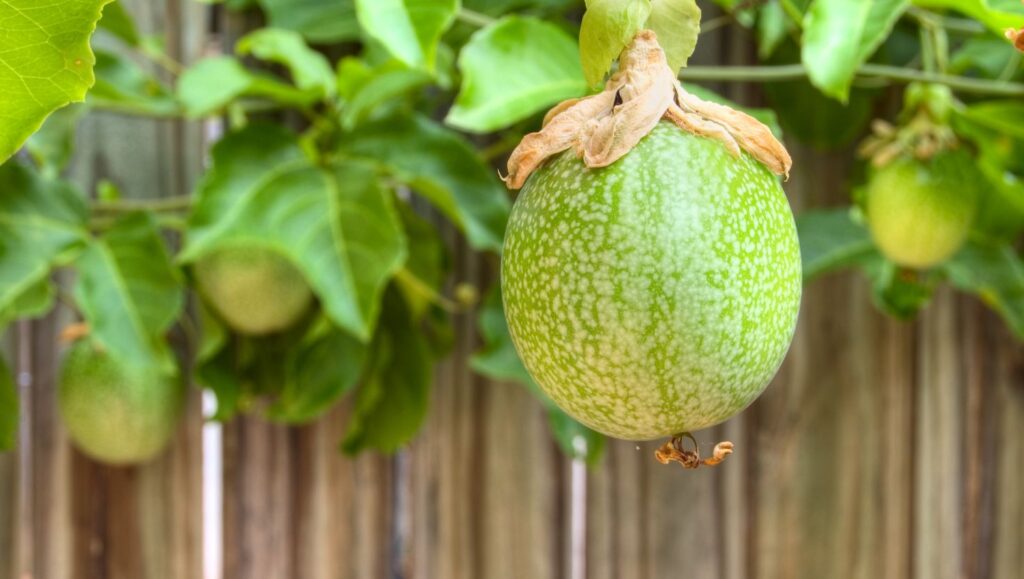
Essential Growing Conditions for Flourishing Passionfruit Vines
- Sunlight: Requires full sun exposure (a minimum of 6 hours daily) for optimal growth and flowering
- Soil: Prefers well-drained, slightly acidic soil (pH 6.5–7.5) to support robust growth and abundant fruit production
- Watering: Deep watering is crucial 2–3 times a week during dry periods to ensure the soil remains adequately moist
- Fertilizing: Use a high-potassium fertilizer every 4–6 weeks throughout the growing season to boost fruit yield
- Pruning: Prune the vines after fruiting to encourage fresh growth and prevent excessive overgrowth
Top Passionfruit Varieties Thriving in Brisbane’s Climate
- Nellie Kelly (Grafted Purple Passionfruit) – Renowned for its disease resistance and impressive productivity
- Panama Red & Panama Gold – These varieties produce larger fruit and are heat-tolerant, making them ideal for subtropical environments
- Sweet Granadilla (Passiflora ligularis) – Yields aromatic fruit but prefers cooler conditions for optimal growth
Proven Strategies for Cultivating Thriving Passionfruit on Your Pergola
- Guide young vines along the pergola beams to foster uniform growth and coverage across the entire structure
- Regularly prune back excessive growth to ensure adequate air circulation and sunlight exposure for optimal plant health
- Consider planting near a fence or trellis to provide increased support as the vine matures
2. Kiwi Fruit (Actinidia deliciosa) – A Sturdy Vine That Requires Strong Support
Best for: Large, robust pergolas with durable support structures
Kiwi vines are famous for their heavy and vigorous growth, necessitating a very strong pergola to adequately support their significant weight. These vines are deciduous, shedding their leaves in winter, which allows sunlight to filter through when shade is less essential. This unique trait contributes to their adaptability across various seasonal conditions and enhances the visual allure of your outdoor environment.
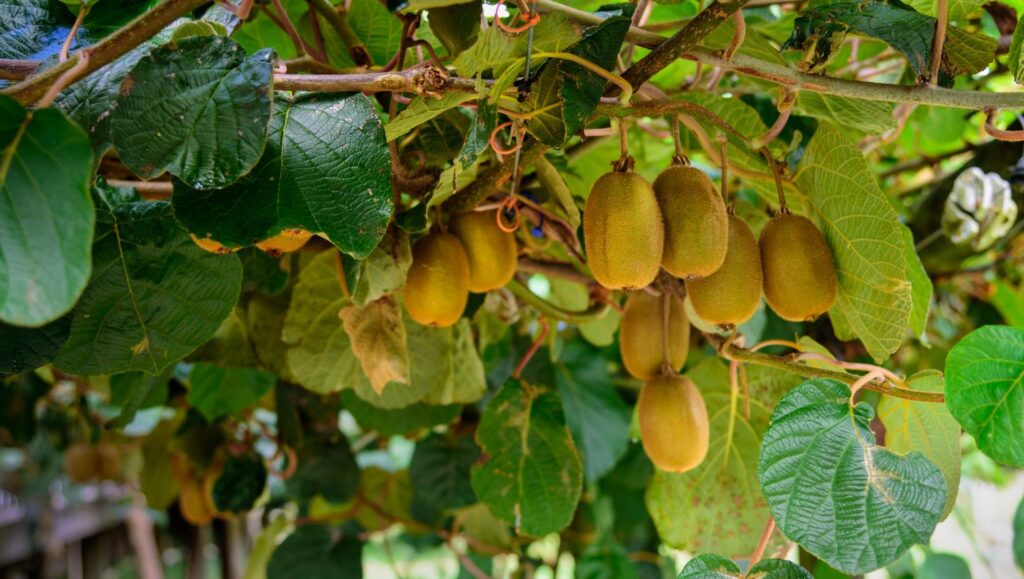
Optimal Growing Conditions for Robust Kiwi Fruit Production
- Sunlight: Requires full sun exposure to ensure successful growth and ample fruiting
- Soil: Thrives in well-drained, fertile soil enriched with compost for optimal nutrient uptake
- Watering: Consistent watering is crucial, particularly during dry spells, to sustain healthy growth
- Fertilizing: Apply organic compost and slow-release fertilizer in spring to promote vigorous growth
- Pruning: Regular pruning is essential to manage growth and maximize fruiting potential
Understanding the Pollination Needs of Kiwi Vines for Optimal Fruiting
Kiwi vines are dioecious, meaning they consist of separate male and female plants. For successful pollination and fruiting, it’s crucial to plant at least one male plant for every 4–5 female plants, thereby fostering a flourishing ecosystem within your garden.
Recommended Kiwi Varieties That Thrive in Brisbane’s Climate
- Hayward Kiwi – The most popular variety, requiring a male pollinator for optimal fruit production
- Bruno Kiwi – Well-known for its early fruiting abilities and robust growth
- Issai Kiwi – A self-pollinating variety well-suited for smaller garden spaces
Expert Strategies for Successfully Growing Kiwi Fruit on Your Pergola
- Install strong wooden or steel support beams to adequately accommodate the vine’s weight
- Space plants at least 3–4 meters apart to ensure ample spread and airflow for healthy growth
- Regular pruning is necessary to control excessive growth and maintain a manageable vine structure
3. Grapes (Vitis vinifera) – Infuse Mediterranean Charm into Your Pergola
Best for: Traditional garden pergolas and inviting outdoor dining areas
Grapes make an excellent addition to a pergola, offering dense shade during the summer while allowing sunlight to filter through in winter when the vines shed their leaves. They require seasonal pruning, but once established, they are generally low-maintenance, making them a favorite among gardeners seeking productivity with minimal effort.
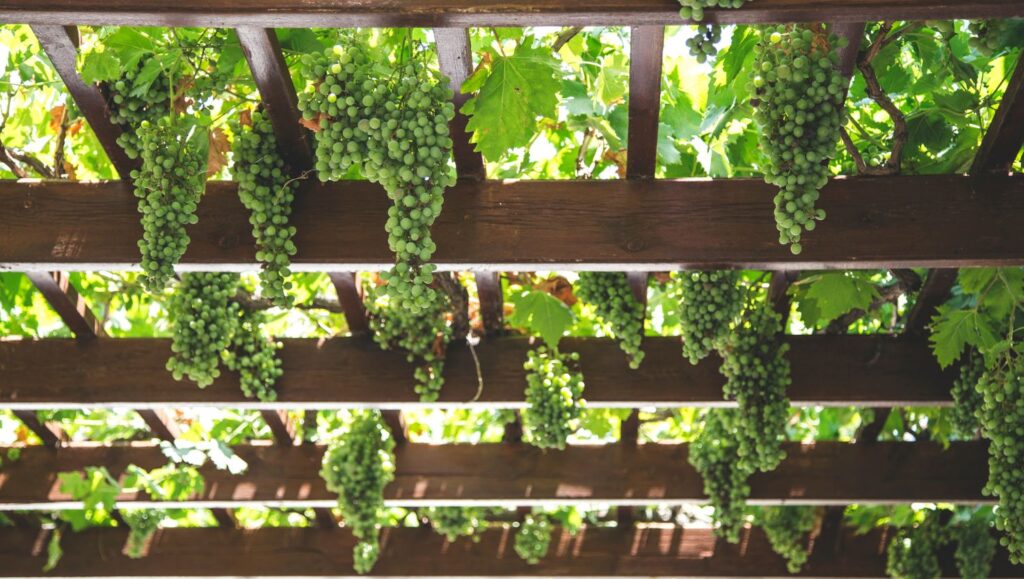
Ideal Growing Conditions for Healthy Grape Production
- Sunlight: Requires full sun exposure (at least 6 hours daily) for optimal growth and fruiting
- Soil: Thrives in well-drained sandy or loamy soil that promotes robust root development
- Watering: Deep watering is essential weekly during dry periods to keep the plants hydrated
- Fertilizing: Apply organic mulch and balanced fertilizer in spring to support vigorous growth
- Pruning: Regular pruning is critical to remove excess wood, promoting fruit production and overall health
Top Grape Varieties Ideal for Brisbane Gardens
- Flame Seedless – A sweet red variety perfect for fresh consumption
- Sultana (Thompson Seedless) – Ideal for both fresh eating and drying
- Black Muscat – Produces large, juicy fruit with a rich flavor profile
Effective Strategies for Growing Grapes on Your Pergola
- Prune annually to maintain shape and encourage fruiting spurs for a generous harvest
- Train vines along the pergola beams for consistent coverage and structural support
- Use netting to protect fruit from birds during the ripening season, ensuring better yields
4. Choko (Sechium edule) – A Quick-Growing, Low-Maintenance Climbing Vine
Best for: Gardeners seeking easy-care options and rapid pergola coverage
Choko (or chayote) is a fast-growing vine that yields an abundance of pear-shaped fruit. Its remarkably low-maintenance nature allows it to cover a pergola in just a few months, making it an ideal choice for those wanting to create shade quickly. However, be cautious to distinguish this plant from the invasive “moth plant,” which poses significant ecological risks.
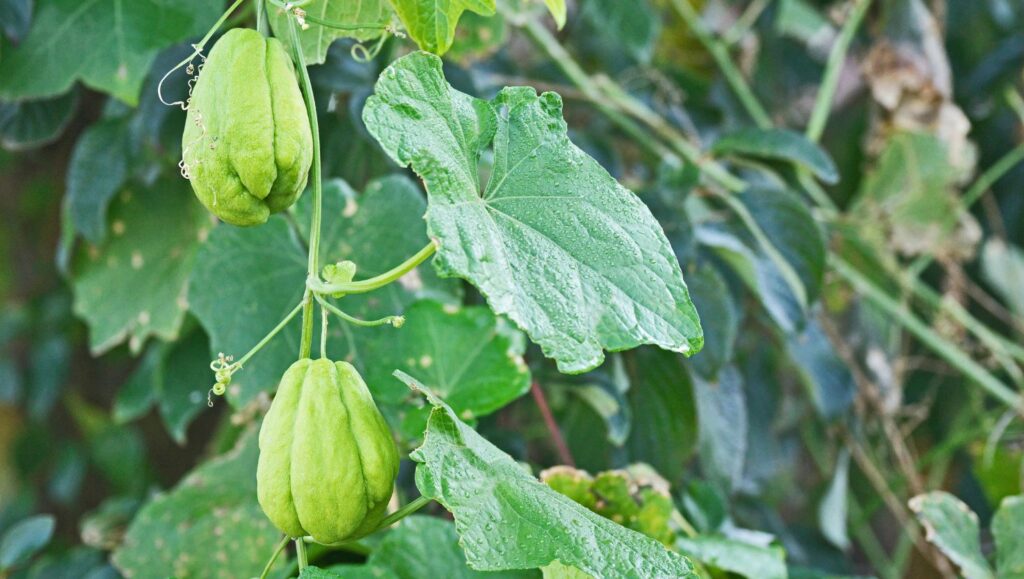
Optimal Growing Conditions for Choko Vines to Flourish
- Sunlight: Thrives in full sun to partial shade for optimal growth
- Soil: Requires well-drained, compost-enriched soil to support healthy development
- Watering: Consistent watering is crucial during dry months to sustain growth
- Fertilizing: Incorporate organic compost and seaweed-based fertilizers to enhance soil fertility
- Pruning: Regular trimming is necessary to manage growth and promote healthy development
Helpful Tips for Successfully Cultivating Choko on Your Pergola
- Choko vines spread quickly, so be ready to prune frequently to maintain control over their growth
- Fruits develop on long tendrils, making harvesting straightforward and efficient
- This plant can withstand drier conditions, making it ideally suited for Brisbane’s climate
Identifying Moth Plant from Choko: Key Differences to Safeguard Your Garden
Many gardeners in Brisbane opt to cultivate choko (Sechium edule) as a convenient vine for edible fruit and rapid pergola coverage. However, some may unintentionally grow the moth plant (Araujia sericifera), which is a toxic, invasive vine posing a significant ecological threat in Queensland. Originally introduced as an ornamental plant, it now represents a serious risk by smothering native flora and spreading uncontrollably.
If you’re cultivating choko or any climbing vines, it’s imperative to learn how to identify and eliminate moth plants promptly to prevent their proliferation, which could jeopardize your garden and local ecosystems.
5. Dragon Fruit (Hylocereus spp.) – A Unique Climbing Cactus for Distinctive Gardens
Best for: Unique edible gardens and pergolas designed for low water usage
Dragon fruit is a type of cactus vine known for producing striking pink or yellow fruit with a sweet and refreshing flavor. This plant is drought-tolerant, making it an excellent choice for low-maintenance gardens that require minimal watering, providing a perfect solution for busy gardeners looking for an impressive addition to their outdoor spaces.
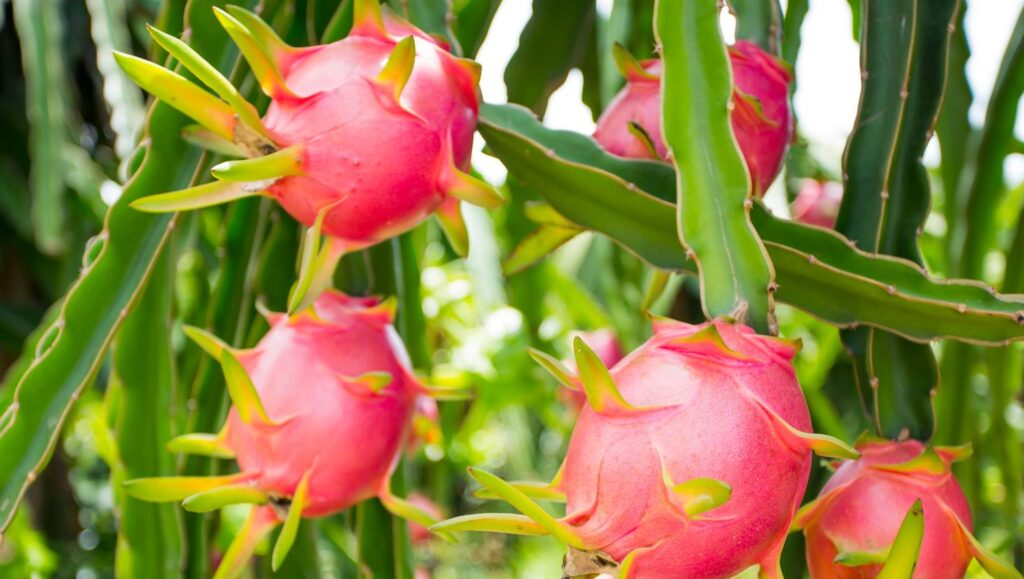
Key Growing Conditions for Successful Dragon Fruit Cultivation
- Sunlight: Requires full sun exposure for optimal growth and fruit yield
- Soil: Thrives in well-drained, sandy soil enriched with organic matter for best results
- Watering: Minimal watering is needed; deep watering only during dry months is sufficient to sustain healthy growth
- Fertilizing: Light applications of organic fertilizer every 2 months will support healthy development
- Pruning: Keep growth controlled to encourage upward climbing and maximize fruit yield
Top Dragon Fruit Varieties to Consider for Your Garden
- White-fleshed dragon fruit – Offers a mild, sweet flavor that many find delightful
- Red-fleshed dragon fruit – Known for its intense sweetness and high antioxidant content, making it a nutritious choice
- Yellow dragon fruit – Smaller in size but exceptionally sweet, perfect for snacking and desserts
Expert Tips for Successfully Cultivating Dragon Fruit on a Pergola
- Ensure a sturdy trellis or pergola support is in place, as dragon fruit can become quite heavy when fruiting
- Be aware that flowers bloom at night and are primarily pollinated by bats or moths, which is crucial for fruit production
- Consider hand pollination techniques to improve fruit yield and maximize production in your garden
Choosing the Ideal Fruiting Vine for Your Pergola
Each type of fruiting vine presents distinct growth habits, support needs, and pruning requirements. Passionfruit is particularly suited for rapid coverage, while kiwi and grapes require sturdier pergolas for adequate support. Alternatively, dragon fruit offers a captivating edible option that necessitates minimal watering, making it versatile for various gardening preferences.
Are you searching for the perfect pergola to support your flourishing fruiting vines?
Contact Pergolas Brisbane at (07) 3064 0661 for expert guidance on custom pergola design and installation tailored specifically to meet the unique needs of your garden.
Best Fruiting Vines for a Pergola in Brisbane – Passionfruit, Kiwi & More
The Article: first appeared on https://writebuff.com
The Article Sure! Please provide the title you’d like me to rewrite. Was Found On https://limitsofstrategy.com

I love the idea of incorporating fruiting vines into a pergola for both shade and delicious produce! In my own garden, I’ve planted passionfruit vines that not only provide a lovely covering but also reward me with sweet fruits, perfect for summer treats. It’s fascinating how these living structures can really enhance our outdoor spaces, making them much more inviting. Plus, having the ability to pick fresh fruit right from your garden adds such a rewarding dimension to gardening.
It sounds like you’re living the sweet life with your passionfruit vines! Not only do they give you that tropical vibe, but they also keep you cool during summer. It’s like having your own little slice of paradise right in your backyard. Plus, who doesn’t love the feeling of being a slightly more sophisticated human when you can whip up a passionfruit cocktail or just enjoy them fresh off the vine?
It’s great to hear about your passionfruit vines! There’s something really special about transforming a structure like a pergola into a living part of your garden. The shade they provide is perfect for those hot summer days, and then you get to enjoy those sweet, tangy fruits right on your doorstep. It’s like nature’s little bonus for all the time and effort you put into your garden.
You really nailed it with that observation about the pergola! There’s something so rewarding about watching those vines grow and cover the structure, isn’t there? It feels like they become a part of the landscape, and it’s fascinating how quickly they fill in the space, creating that perfect combo of shade and beauty.
Incorporating fruiting vines into a pergola is such a smart idea. It sounds like your passionfruit vines are really thriving and adding both beauty and function to your garden. I’ve been considering doing something similar in my own space, but I’ve been debating between kiwis or grapes. There’s something special about being able to escape the summer heat under a canopy of greenery while knowing there’s a sweet treat waiting to be picked just a few steps away.
It’s great to hear you’re considering adding fruiting vines to your pergola! Passionfruit vines have definitely added a lovely touch to my garden, both visually and in terms of yield. I can see why you’re torn between kiwis and grapes; both have their own charm and deliciousness.